
Abraham Lincoln was an American lawyer, politician, and statesman who served as the 16th president of the United States from 1861 until his assassination in 1865. Lincoln led the United States through the American Civil War, defending the nation as a constitutional union, defeating the insurgent Confederacy, playing a major role in the abolition of slavery, expanding the power of the federal government, and modernizing the U.S. economy.
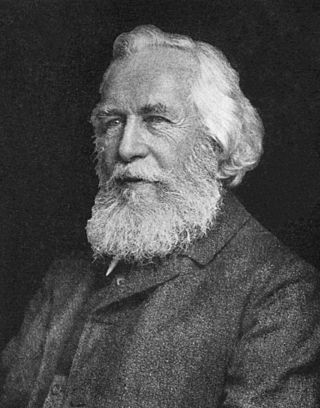
Ernst Heinrich Philipp August Haeckel was a German zoologist, naturalist, eugenicist, philosopher, physician, professor, marine biologist and artist. He discovered, described and named thousands of new species, mapped a genealogical tree relating all life forms and coined many terms in biology, including ecology, phylum, phylogeny, and Protista. Haeckel promoted and popularised Charles Darwin's work in Germany and developed the influential but no longer widely held recapitulation theory claiming that an individual organism's biological development, or ontogeny, parallels and summarises its species' evolutionary development, or phylogeny.

William Paley was an English Anglican clergyman, Christian apologist, philosopher, and utilitarian. He is best known for his natural theology exposition of the teleological argument for the existence of God in his work Natural Theology or Evidences of the Existence and Attributes of the Deity, which made use of the watchmaker analogy.

John Fiske was an American philosopher and historian. He was heavily influenced by Herbert Spencer and applied Spencer's concepts of evolution to his own writings on linguistics, philosophy, religion, and history.

In the 1860s, the Copperheads, also known as Peace Democrats, were a faction of the Democratic Party in the Union who opposed the American Civil War and wanted an immediate peace settlement with the Confederates.

During the American Civil War, the United States was referred to as simply the Union, also known colloquially as the North, after eleven Southern slave states seceded to form the Confederate States of America (CSA), which was called the Confederacy, also known as the South. The name the "Union" arose from the declared goal of the United States, led by President Abraham Lincoln, of preserving the United States as a constitutional federal union.
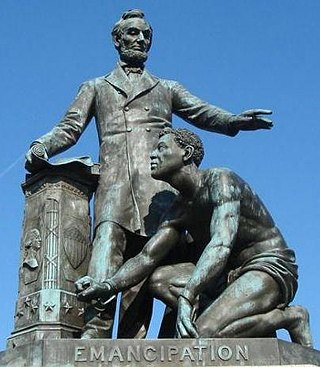
Abraham Lincoln's position on slavery in the United States is one of the most discussed aspects of his life. Lincoln frequently expressed his moral opposition to slavery in public and private. "I am naturally anti-slavery. If slavery is not wrong, nothing is wrong," he stated. "I can not remember when I did not so think, and feel." However, the question of what to do about it and how to end it, given that it was so firmly embedded in the nation's constitutional framework and in the economy of much of the country, even though concentrated in only the Southern United States, was complex and politically challenging. In addition, there was the unanswered question, which Lincoln had to deal with, of what would become of the four million slaves if liberated: how they would earn a living in a society that had almost always rejected them or looked down on their very presence.
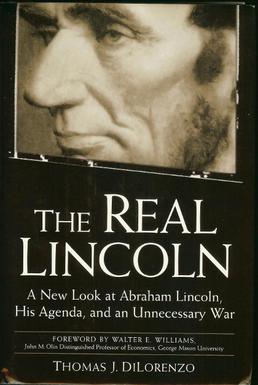
The Real Lincoln: A New Look at Abraham Lincoln, His Agenda, and an Unnecessary War is a biography of Abraham Lincoln written by Thomas J. DiLorenzo, a former professor of economics at Loyola University Maryland, in 2002. He was severely critical of Lincoln's United States presidency.
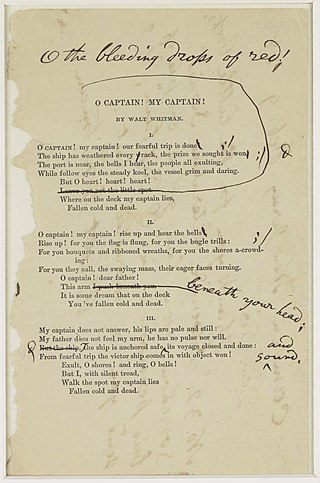
"O Captain! My Captain!" is an extended metaphor poem written by Walt Whitman in 1865 about the death of U.S. president Abraham Lincoln. Well received upon publication, the poem was Whitman's first to be anthologized and the most popular during his lifetime. Together with "When Lilacs Last in the Dooryard Bloom'd", "Hush'd Be the Camps To-Day", and "This Dust Was Once the Man", it is one of four poems written by Whitman about the death of Lincoln.
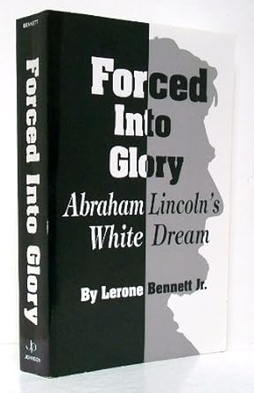
Forced into Glory: Abraham Lincoln's White Dream (2000) is a book written by Lerone Bennett Jr., an African-American scholar and historian, who served as the executive editor of Ebony for decades. It criticizes United States President Abraham Lincoln and claims that his reputation as the "Great Emancipator" during the American Civil War is undeserved.

Allen Carl Guelzo is an American historian who serves as the Thomas W. Smith Distinguished Research Scholar and Director of the Initiative on Politics and Statesmanship in the James Madison Program at Princeton University. He formerly was a professor of History at Gettysburg College.

Abraham Lincoln grew up in a highly religious Baptist family. He never joined any Church, and was a skeptic as a young man and sometimes ridiculed revivalists. He frequently referred to God and had a deep knowledge of the Bible, often quoting it. Lincoln attended Protestant church services with his wife and children. "Especially after the death of his young son Willie in 1862, Lincoln moved away from his earlier religious skepticism." Some argue that Lincoln was neither a Christian believer nor a secular freethinker.
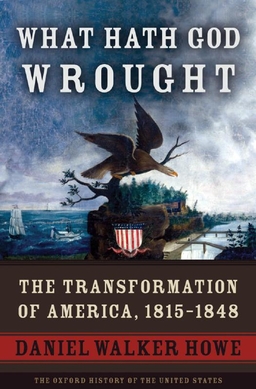
What Hath God Wrought: The Transformation of America, 1815–1848 is a nonfiction book about the history of the United States written by historian Daniel Walker Howe. Published in 2007 as part of the Oxford History of the United States series, the book offers a synthesis history of the early-nineteenth-century United States in a braided narrative that interweaves accounts of national politics, new communication technologies, emergent religions, and mass reform movements. The winner of multiple book prizes, including the 2008 Pulitzer Prize for History, reviewers widely praised What Hath God Wrought. Historian Richard Carwardine said it "lays powerful claim to being the best work ever written on this period of the American past".
This bibliography of Abraham Lincoln is a comprehensive list of written and published works about or by Abraham Lincoln, the 16th president of the United States. In terms of primary sources containing Lincoln's letters and writings, scholars rely on The Collected Works of Abraham Lincoln, edited by Roy Basler, and others. It only includes writings by Lincoln, and omits incoming correspondence. In the six decades since Basler completed his work, some new documents written by Lincoln have been discovered. Previously, a project was underway at the Papers of Abraham Lincoln to provide "a freely accessible comprehensive electronic edition of documents written by and to Abraham Lincoln". The Papers of Abraham Lincoln completed Series I of their project The Law Practice of Abraham Lincoln in 2000. They electronically launched The Law Practice of Abraham Lincoln, Second Edition in 2009, and published a selective print edition of this series. Attempts are still being made to transcribe documents for Series II and Series III.

Robert King Stone was an American physician and professor at Columbian College Medical School. He was considered "the dean of the Washington medical community".
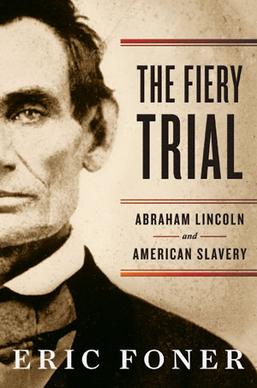
The Fiery Trial: Abraham Lincoln and American Slavery is a historical non-fiction book written by American historian Eric Foner. Published in 2010 by W. W. Norton & Company, the book serves as a biographical portrait of United States President Abraham Lincoln, discussing the evolution of his stance on slavery in the United States over the course of his life. The Fiery Trial, which derives its title from Lincoln's Annual Message to Congress of December 1, 1862, was the 22nd book written by Foner, the DeWitt Clinton Professor of History at Columbia University. It was praised by critics and won the 2011 Pulitzer Prize for History, the Bancroft Prize, and the Lincoln Prize.
James Andrew Secord is an American-born historian. He was a professor of history and philosophy of science within the Department of History and Philosophy of Science at the University of Cambridge, and a fellow of Christ's College. He was also the director of the project to publish the complete Correspondence of Charles Darwin. Secord is especially well known for Victorian Sensation, his award-winning study of the reception of the anonymous Vestiges of the Natural History of Creation, a pioneering evolutionary book first published in 1844.
This article documents the political career of Abraham Lincoln from the end of his term in the United States House of Representatives in March 1849 to the beginning of his first term as President of the United States in March 1861.
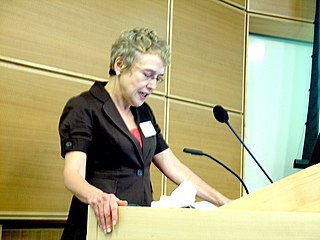
Carolyn Marvin is a professor and author that specializes in communication, culture and media, political communication, and technology and society. Marvin is currently the Frances Yates Emeritus Professor of Communication at the University of Pennsylvania's Annenberg School for Communication. Marvin is the author of two major publications, When Old Technologies Were New and Blood Sacrifice and the Nation: Totem Rituals and the American Flag.
Jacob Darwin Hamblin is an American professor of history, specializing in international aspects of science, technology, and the global environment. His 2013 book Arming Mother Nature: The Birth of Catastrophic Environmentalism won two prestigious awards: the 2014 Paul Birdsall Prize and the 2016 Watson Davis and Helen Miles Davis Prize.
















